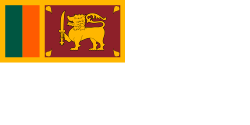Naval Patrolmen
| Naval Patrolmen Branch | |
|---|---|
| Active | 1987-Present |
| Country | Sri Lanka |
| Branch | Sri Lanka Navy |
| Type | Naval Infantry |
| Role |
Force Protection, Amphibious Operations |
| Part of | Sri Lanka Navy |
| Nickname(s) | The Regiment |
| Motto(s) | Constant Protection |
| Engagements |
Insurrection 1987-89 Sri Lankan Civil War |
| Sri Lanka Navy |
|---|
 |
| Components |
| History |
| Ships |
| Personnel |
Naval Patrolmen Branch is a branch of the Sri Lanka Navy that performs the role of naval infantry. Effectively members of this branch are soldiers of the navy. Originally limited for base and harbour security, in recent years Naval Patrolmen have taken part in offensive and defensive operations against the LTTE in conjunction with the Sri Lanka Army or independently, using both infantry and light armored units. It has also taken part in amphibious operations.
History
Naval personal have been deployed on shore patrol duties on many occasions since the formation of the Royal Ceylon Navy in 1950. Regularly naval personal were deployed to support the police to control civil disobedience along with the Army during many harthals and riots during the 1950s and 1960s. During the 1962 coup d'état attempt the internal security personnel of the navy were detailed to guard Prime Minister's House (Temple Trees). In 1971 navy personal were deployed in various parts of the island to suppress communist insurgents during the 1971 JVP Insurrection. Since the 1970s up until the late 1980s the navy personal guarded the Broadcasting Corporation station in Colombo.
With the escalation of the Sri Lankan Civil War and increased threat to naval bases that were launching pads for naval operations to curb LTTE sea movements, the Vice Admiral Ananda Silva, the Commander of the Navy instituted the formation of the Naval Patrolmen Branch in 1987 to carry out operations on land. This unit was formed primary as a protective force for base and port security, but increased its numbers and scope for amphibious and land combat operations. To archive its objectives the patrolmen are equipped with light arms and have mortars, Unibuffel light armored vehicles.
Naval Patrolmen have taken part in several major combat operations alongside Army units, these include Operation Sea Breeze, Operation Balavegaya, Operation Riviresa and Operation Jayasikurui having raised to the strength of 3 battalions by 1997. Its personal fought till the biter end during the Battle of Pooneryn. During the last part of the civil war known as the Eelam War IV Naval Patrolmen garrisoned and defended the government controlled islands around the Jaffna Peninsula such as Delft Island and Kayts. Since 1987, the Naval Patrolmen frequently mounts the guard at the Presidents House, and carry out other ceremonial duties.
In 2016, the Sri Lanka Navy formed its first battalion of Marines consisting of 6 officers and 158 sailors from the Naval Patrolmen branch, specializing in amphibious warfare. The unit started training under the assistance of the 11th Marine Expeditionary Unit of the United States Marine Corps in November 2016 [1][2]"First ever Marines of Sri Lanka Navy pass out in Mullikulam". Retrieved 2017-02-27.</ref>.
Organisation and current role
Officers and patrolmen are organized into battalions based at naval bases island wide and independent detachments. All units come under the command of Director Naval Land Operations, who in turn reports to Director General (Operations), however individual units come under that command of the Naval Area Command that they belong too.
At first the primary role was harbor and base security, but increased its numbers and scope for amphibious and land combat operations. In recent years with expansion of the number of battalions, patrolmen have begun supporting the Sri Lanka Army in manning defence lines in the north central part of the country and taking part in offensive operations jointly or independently. This led to the formation of the North Central Command (which covers a landlocked area). The security of the Colombo harbor, along with all other harbors in the country is handled by the navy, as the Sri Lanka Navy is the Designated Authority for implementing International Ships and Port Facility Security (ISPS) Code in Sri Lanka. To achieve its objectives, patrolmen are equipped with light arms and have mortars and light armoured vehicles.
The units Training Centre is located at SLNS Pandukabaya.
Weapons
- Land vehicles
- Unibuffel - Mine-protected APC
- Unicorn - Mine-protected APC
- Land Rover Defender
- Mortars
- Type 84 (W84) 82 mm mortars
- Type 89 60 mm mortars
- Small arms
|
Handguns Assault Rifles
|
Sub-Machine guns Machine guns
|
Sniper Rifles Grenade launchers
Rocket launchers
|
See also
- Military of Sri Lanka
- Sri Lanka Navy
- Military ranks and insignia of the Sri Lanka Navy
- Sri Lanka Air Force Regiment